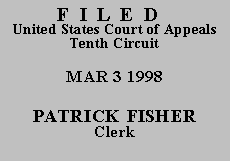

| Marvin Randy, SCHAMP, | No. 97-3307
(D.C. No. 97-CV-4169-DES) |
When Mr. Schemp failed to comply with the magistrate judge's order, the district court dismissed his complaint under Rule 8. In addition, acting sua sponte, the court dismissed Mr. Schemp's cause of action for failure to state a claim under Fed. R. Civ. P. 12(b)(6). We review the district court's Rule 12(b)(6) ruling de novo, see Chemical Weapons Working Group, Inc. v. United States Dep't of the Army, 111 F.3d 1485, 1490 (10th Cir. 1997), and affirm.
We are obliged to construe Mr. Schemp's pro se pleadings liberally. See Haines v. Kerner, 404 U.S. 519, 520-21 (1972). Yet even under this standard, we are unable to decipher appellant's complaint. And, because Mr Schemp declined the opportunity to amend his pleadings, dismissal sua sponte was therefore appropriate under Rule 12(b)(6). See Whitney v. New Mexico, 113 F.3d 1170, 1173 (10th Cir. 1997) (holding that district court may dismiss sua sponte pro se complaint under Fed. R. Civ. P. 12(b)(6) only when "patently obvious that the plaintiff could not prevail on the facts alleged, and allowing [him] an opportunity to amend [his] complaint would be futile." (quoting McKinney v. Oklahoma, 925 F.2d 363, 365 (10th Cir. 1991)).
AFFIRMED.
The mandate shall issue forthwith.
ENTERED FOR THE COURT
Carlos F. Lucero
Circuit Judge
*. The case is unanimously ordered submitted without oral argument pursuant to Fed. R. App. P. 34(a) and 10th Cir. R. 34.1.9. This order and judgment is not binding precedent, except under the doctrines of law of the case, res judicata, and collateral estoppel. The court generally disfavors the citation of orders and judgments; nevertheless, an order and judgment may be cited under the terms and conditions of 10th Cir. R. 36.3.
1. Mr. Schemp protests that the magistrate judge's order exceeded his statutorily proscribed authority under 28 U.S.C. § 636 because Mr. Schemp did not consent to the magistrate judge's participation in the case. However, the magistrate judge's order is authorized under 28 U.S.C. § 636(b)(1)(A), which provides for the disposition of pre-trial matters. That authority is not contingent on Mr. Schemp's consent to the magistrate's participation. Compare 28 U.S.C. § 636(c)(1).